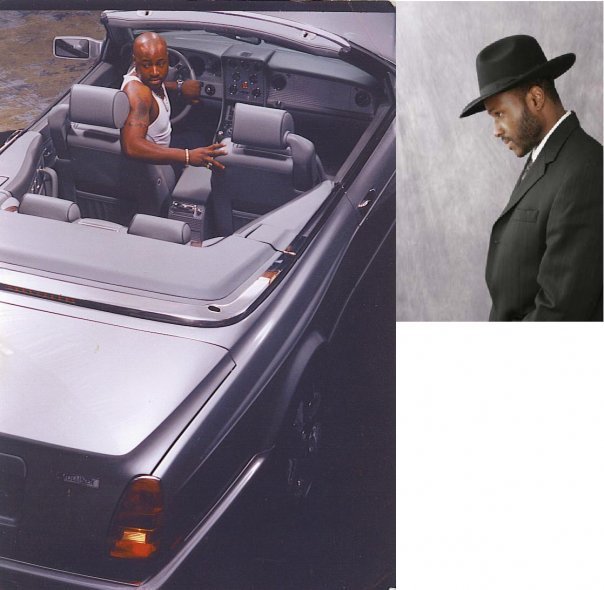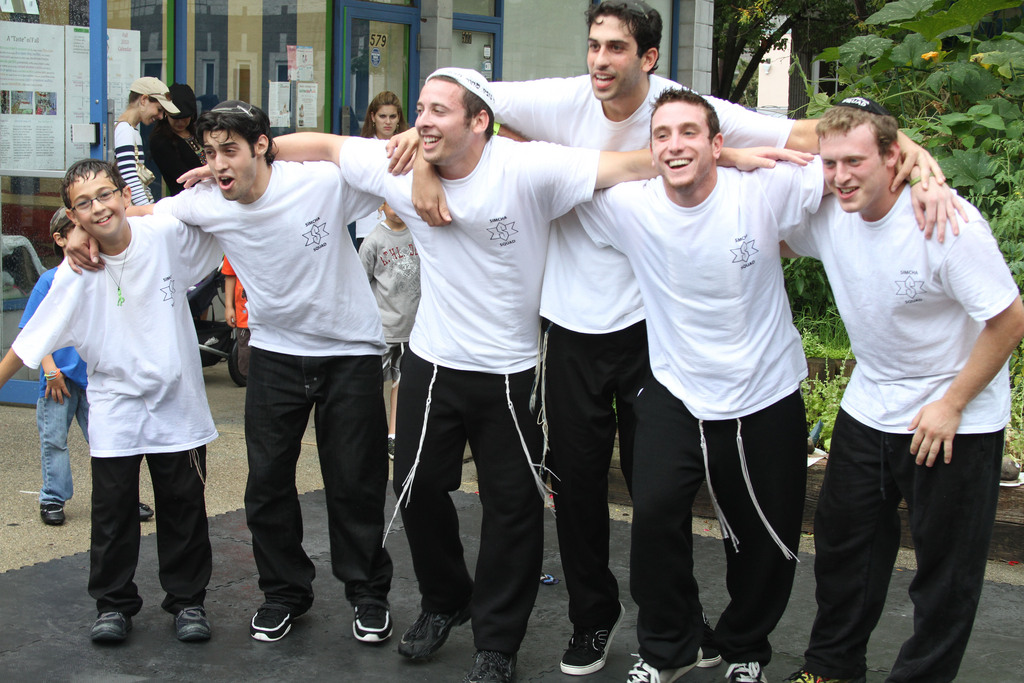A long journey ends in gunfire: remembering Yoseph Robinson
Posted
By Michael Orbach
Issue of August 27, 2010/ 17 Elul 5770
He exchanged gold chains for tefilin straps, hip hop songs for nigunim and embraced Judaism to escape a life of gangs, drugs and crime. But in the end, his original life found him. Yoseph Robinson, 34, a Jamaican-born convert to Orthodox Judaism and a former hip-hop record label executive, was killed in a botched robbery at the kosher liquor store where he worked, late on Aug. 19.
Thousands attended Robinson’s funeral in Borough Park on Monday night, a standing room only crowd that included dozens of his relatives and friends from Brooklyn’s Jamaican community. The crowd spilled over to the street outside Shomrei Hadas Chapel. Robinson was to be buried Thursday in Jamaica. A minyan of Jews was preparing to fly there for the burial and to consecrate his grave in a family plot as a Jewish cemetery.
Lahavah Shneor, Robinson’s girlfriend of one month was with him when an armed, masked man entered MB Vineyards on Nostrand Avenue and Avenue J at 9:30 p.m. and demanded her jewelry and money from the register. As Shneor complied the man began threatening her with his gun. Robinson grabbed the man hand and jumped over the counter. As they struggled Robinson yelled at Shneor to run to the back of the store.
“It wasn’t about saving the stupid jewelry,” Shneor said. “It wasn’t that. It wasn’t my jewelry he was interested in saving.”
Shneor called 911 and then heard shots. She rushed out of the storeroom and found Robinson bleeding profusely, lying by the door. He was pronounced dead hours later in a Brooklyn hospital. His last words reportedly were, “Tell my daughter I love her.”
The gunshots were the intermittent and final sounds in the turbulent life of Yoseph Robinson.
Chester Robinson, who changed his name to Yoseph when he converted in 2000, was born in Spanish Town, Jamaica. In his unpublished memoir, “From Jamaican Hip Hopper to Orthodox Jew,” he reminisces fondly about picking mangos and swimming in the Rio Cobre. When he was eight, his grandmother began raising domesticated animals; Robinson was assigned the task of feeding them.
“There I was, a little Moses or David, herding the sheep in the rolling emerald fields of G-d’s majestic wilderness,” Robinson wrote. “I guess there were signs even back then that I would discover my path to G-d.”
At age 12 Robinson moved with his family to Brooklyn. There began the troubled part of his teenage years. He was bright but did not fare well in school and was, in his own words, “routinely being summoned to the dean’s office.”
“In the Hood, whether it’s sitting in a classroom before you drop out, or out on the street selling drugs, the single most important objective is not money or sex or even power,” Robinson wrote. “It’s about one thing and one thing only: Respect.”
Eventually Robinson dropped out of high school and moved down to Philadelphia with some friends and began selling drugs. He had more than one run-in with the law and was shot in a dispute with other gang members.
As he related: “I turned around and I was staring down the muzzle of a silver Beretta... Without hesitation he breathed the words “die nigger” and simultaneously fired off a few rounds. I was hit once in the upper body and once in my left arm.”
Robinson was fortunate and survived. The bullets, he writes, ruptured his spleen and shattered some of the bones in his arm. Seeking to emulate his heroes, the rappers Jay-Z and 50 Cent, Robinson traveled to L.A. to make a career in the hip-hop industry. He began his own label, “No Exit,” and put out his first CD “Exodus.”
“Ain’t no exit on the game, the rules just change, the streets still the same,” he rapped on the first track.
On the eve of the disk’s release, Robinson found himself drawn inexorably to Judaism.
“In truth, I didn’t choose Judaism,” Robinson wrote. “Judaism chose me. Or, more accurately, I feel that G-d set a complex series of seemingly random, incongruous events in play that led to my inevitable decision to become an Orthodox Jew. In other words, I don’t think it was a coincidence that my Russian girlfriend happened to be Jewish, or that when I moved to an apartment in the Valley to distance myself from the music scene, it just happened to be in a concentrated Orthodox Jewish neighborhood... Or that I unknowingly walked into a Jewish book store one day, instead of the Dalton’s book store I usually shopped at.”
Robinson married and had a daughter, Chana. The couple divorced and three years ago Robinson moved back to Brooklyn, this time as a religious Jew in the Orthodox section of Midwood. He worked at the liquor store owned by his friend Benji Ovitz, while he worked on a book about his experiences. He spoke often in Jewish schools and shuls about his former life and his transformation to a religiously observant Jew.
“Yoseph began speaking to others to demonstrate that it is never too late to turn your life around,” said Ovitz in a eulogy for his best friend, whom he said, “lived his life according to standards of ethics and integrity that few of us can ever attain.”
Yitz Jordan, a friend of Robinson’s who is also a black convert and known as the rapper Y-Love, said he asked Robinson to perform on a track with him, but Robinson declined.
“Hip-hop represented who he used to be,” Jordan explained.
A promo video Robinson released for his book contrasts his past life with his present. In the video’s early frames, Robinson appears getting out of a white Lamborghini, in a tight t-shirt, his upper arm covered in tattoos. He speaks in a heavy Jamaican accent.
The next frame shows Robinson in a white shirt and suit, a black hat on his head. He speaks quietly about being someone into the “hustle, bustle, dribble” who eventually found his way to “praying three times a day” and “recognizing that there is a higher power that we have to answer to.”
Robinson was a popular fixture in the Brooklyn Jewish community. After his death hundreds gathered at the liquor store, which remained closed Tuesday evening. Pictures of Robinson hung on the lowered metal gate.
“The Jewish community embraced him and saved his life,” his brother-in-law, Shawn Walters, said at the funeral.
Shais Rison, another close friend, who blogs under the name MaNishtana, spent several recent Thursday evenings at the store with Robinson and Shneor. This past week he missed their get-together and was on the train when he learned of Robinson’s death.
“I was hoping it was the worst practical joke in the world,” he said about when he was told the news. “I didn’t believe it. We lost one of our brightest lights last night, as people, as Jews, as Jews of color.”
After his murder, Robinson’s friend worried about the funeral and who would say kaddish for him, since as a convert, by Jewish law, Robinson has no previous family.
“His ex-wife is Jewish,” Jordan said, “But it’s not like she can say kaddish. I think someone from the community is going to pick it up. It’s the nichsei haguf, the little things that you have if you have a family.”
“I don’t see how Hashem could take such a beautiful neshoma away from us,” Akedah Fulcher, another friend wondered. “He was a proud person, he made being multicultural and Jewish fun. [The media] keeps on focusing on him being a convert, I would rather them focus on the fact that he was a Jew. His cultural background enhanced his Jewish identity. He could have contributed so much.... Hashem gives and Hashem takes.”
Robinson met Shneor, a Jamaican Jew, when she entered the store for a purchase.
The two had a lot in common, she said, including a love for Dominican food, and Robinson would walk to her family’s house in Borough Park for Shabbat meals.
Minutes before the robbery, the two had been goofing off on Facebook. The last thing Robinson wrote was a message on Schneor’s Facebook wall saying that she could call him anytime.
Though the manuscript for his book is not complete, Shneor says she hopes it will be published, especially for the sake of Robinson’s daughter, who lives with her mother in California.
“He was the bravest man I’ll ever meet... I want her to read the book and be proud of her daddy,” Shneor said. “He was somebody for her to be proud of.”
Report an inappropriate comment
Comments

 72.0°,
Mostly Cloudy
72.0°,
Mostly Cloudy 











